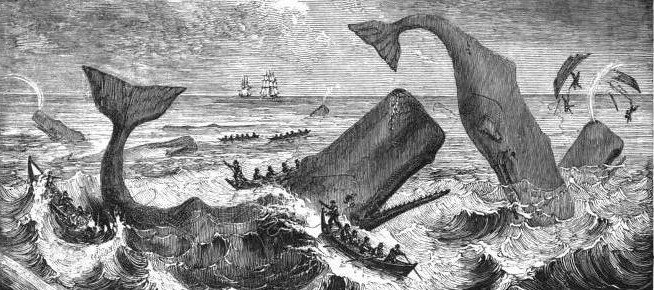In Moby-Dick Ishmael often reminds us that Christians do not always abide by what they preach. With a passing reference to Adam and Eve, “the two orchard thieves,” in the first chapter of the book, he avows that ever since the Garden of Eden humankind has been attempting to “pay off” an ever-lurking debt to God that has evolved into an installment payment and continuous burden for humankind.
On the one hand, Ishmael freely states that payment is one of the attractions of going to sea in someone’s employ, “always […] as a sailor” rather than as a mere passenger, “because they make a point of paying me for my trouble, whereas they never pay passengers a single penny that I ever heard of. On the contrary, passengers themselves must pay. And there is all the difference in the world between paying and being paid.” On the other hand, many biblical scriptures may well taunt him, especially those from the New Testament. Recall Jesus’s well known analogy for the opposite aims of wealth and eternal peace from Matthew 19:24: “It is easier for a camel to go through the eye of a needle, than for a rich man to enter into the kingdom of God.” Or Matthew 6:19, which Captain Bildad is quoting under his breath when Ishmael’s share of the Pequod’s profits is being decided: “Lay not up for yourselves treasures upon earth, where moth and rust doth corrupt, and where thieves break through and steal…” This latter quotation is illuminative of the reference to the “orchard thieves” from “Loomings.” Later scripture defines thievery, the act of someone taking property from another and converting it to his or her own use, as a corrupt practice unique to earthly existence; however, in the early chapters of Genesis, as Ishmael reminds us, the thievery of Adam and Eve was of a more complicated sort for occurring while they lived a paradisal, divinely-sanctioned state.
There is no doubt about their crime, just the inherent earthliness of the act. Adam and Eve stole the fruit of the Tree of the Knowledge of Good and Evil in order to convert it to their own uses. Never more godlike, humankind then wanted to be more like God. Though they lived in Paradise, their greed made them desire wealth and power. In Ishmael’s view the idea of payment is one that tracks through the entire Bible and is not to be localized in those well-known verses from Matthew. The whole of Holy Scripture is a running commentary on the idea of earthly payment as it is caught up in a complex web of free will, grace, and potential salvation, ever since the fall in the Garden of Eden. Ishmael contains the idea of payment, any payment, in a larger question of whether or not humankind can recover what was lost by Adam and Eve.
The act of paying is perhaps the most uncomfortable infliction that the two orchard thieves entailed upon us. But being paid—what will compare with it? The urbane activity with which a man receives money is really marvelous, considering that we so earnestly believe money to be the root of all earthly ills, and that on no account can a monied man enter heaven. Ah! how cheerfully we consign ourselves to perdition!
Melville reveals an ironic truth in Ishmael’s interpretation of payment. Money is the root of all earthly ills, and yet money is necessary to live. We work to earn money, earnestly believing that money cannot buy salvation. We desire earthly success, knowing it is fleeting. This logic seems a bit “twiske-tee be-twisk,” like Ahab’s, in his monomaniac fixation on revenging himself upon Moby Dick. In the same, mildly abstract way humankind may be understood as trying to revenge itself upon on Adam and Eve for forever making us indebted to God. Of course, there’s a larger irony afoot. Ishmael identifies “the act of paying” as “the most uncomfortable infliction” of human kind, but revels in the incomparable, “marvelous” feelings that follow upon being paid. The irony being: who can be paid without someone, somewhere enduring the infliction of paying?
